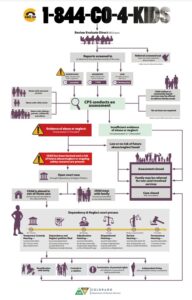How do I prepare my child for our visit?
- Unless the investigator has instructed you otherwise, we advise parents to give children a general idea about what River Bridge is and why you are going.
- You might say something like, “River Bridge is a safe place where kids can talk about things that have happened to them.”
- If your child has told you about the concern, you might say, “You’ ll be talking more about what you told me happened with _______.”
- If you need guidance on an age-appropriate way to explain River Bridge, please feel free to call us before your appointment for suggestions.
Do:
- Give your child permission to talk with the interviewers.
- Tell your child it is a safe place to talk openly and honestly.
- Tell your child that the person they will talk to is someone who talks to kids every day.
- Tell your child you will be in another room during the interview, and that you will the not be leaving the Center.
Don’ t:
- Tell your child what to say.
- Promise treats or rewards to your child for talking.
- Try to answer questions that you don’ t know.
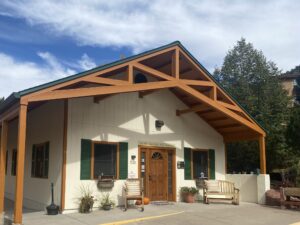
If you are coming to River Bridge for a FORENSIC INTERVIEW, you will be coming to 520 21st Street in Glenwood Springs, Colorado. We are a small cottage-like building located behind Public Health, the red brick building. There is a reserved parking space for you right in front of our building.
- Our Victim Advocate will greet you and your child, and get you settled in our family room. A volunteer may be on hand to play with your child(ren) while you speak with the advocate.
- The Forensic Interviewer will speak one-on-one with your child, using open-ended, developmentally appropriate questions with the aim of fact-finding.
- You will talk with our Family Advocate about what you and your child are experiencing and if there are any needs we can help you meet, including mental health and medical care.
- After the interview, you will have an opportunity to meet privately with the investigators (law enforcement and/or department of human services) to get questions answered and information for next steps. RBRC is a separate nonprofit, a neutral partner who work with the investigators.
- Your child may be referred for a mental health assesssment or a medical exam/checkup. We may schedule you for these appointments at the time of your visit or reach out soon after.
- Before you leave, you will know what the investigators’ and our staff’s next steps are.
Due to limited space at River Bridge and in order to ensure your privacy, please make your caseworker or law enforcement officer aware of anyone coming with you to River Bridge, including other children, so that we may coordinate with a volunteer to offer childcare support.
River Bridge is also a Cell Phone Free Zone.
If you are coming to River Bridge for MENTAL HEALTH OR MEDICAL CARE, you will be coming to 504 21st Street in Glenwood Springs.
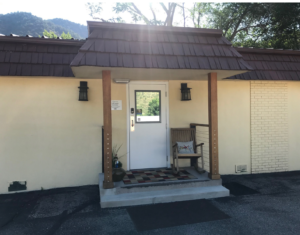
This building is located diagonally from River Bridge. Our Office Administator, nurse, or mental health therapist will greet you and your child, and get you settled in our family room. A volunteer may be on hand to play with your child(ren) while you speak with the nurse or therapist.
Location:
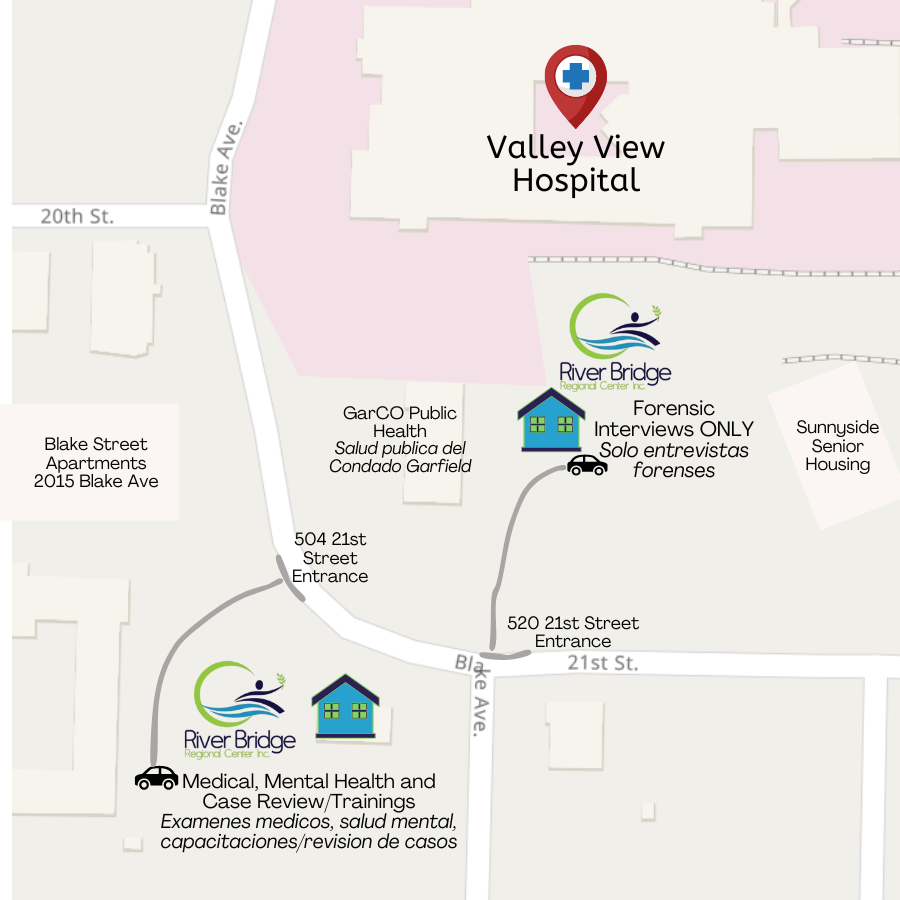
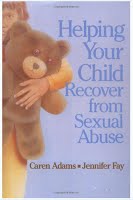 Helping Your Child Recover From Sexual Abuse
Helping Your Child Recover From Sexual Abuse
Written by Caren Adams & Jennifer Fay
The sexual abuse of a child creates a devastating family crisis. Parents want to know what to do and say to help their child, both immediately and in the long term. Helping your Child Recover from Sexual Abuse offers practical guidance for parents who courageously face the days and months after a child’ s abuse. Written in a positive, reassuring jargon-free style, it discusses each stage of a child’ s recovery. Information for parents appears on the left-hand pages; sample conversations and activities for parent and child together are on the right-hand pages. The book presents the collective wisdom of numerous parents who have been through this experience and have learned how to help their children feel stronger, safer, braver, more lovable, worthwhile, and competent. Topics covered: What to do when abuse is first disclosed; Helping a child cope with the legal system; Responding to the reactions of friends and loved ones; Children’ s reactions to abuse; How parents and children grieve differently; Rebuilding a child’ s self-esteem; Dealing with confusion about sexuality; Helping a child feel safe and in control; Typical problems at different ages; Recognizing when a child is getting better.
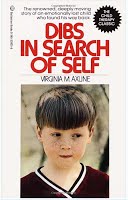 Dibs In Search of Self: The Renowned, Deeply Moving Story of an Emotionally Lost Child Who Found His Way Back
Dibs In Search of Self: The Renowned, Deeply Moving Story of an Emotionally Lost Child Who Found His Way Back
Written by Virginia M. Axline
The classic of child therapy. Dibs will not talk. He will not play. He has locked himself in a very special prison. And he is alone. This is the true story of how he learned to reach out for the sunshine, for life . . . how he came to the breathless discovery of himself that brought him back to the world of other children.
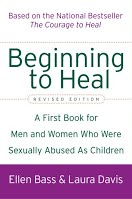 Beginning to Heal: A First Book for Men and Women Who Where Sexually Abused As Children
Beginning to Heal: A First Book for Men and Women Who Where Sexually Abused As Children
Written by Ellen Bass & Laura Davis
Beginning to Heal offers hope and guidance for all survivors starting the healing journey. No matter how great your pain today, you can not only heal but thrive. Based on the authors’ bestseller The Courage to Heal, this Revised Edition of Beginning to Heal takes you through the key stages of the healing process, from crisis times to breaking the silence, grief, and anger, to resolution and moving on. It includes inspirational highlights, clear explanations, practical suggestions, and compelling accounts of survivors’ pain, their strength, and their triumphs.
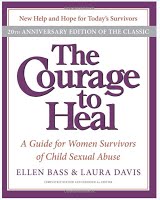 The Courage to Heal: A Guide for Women Survivors of Child Sexual Abuse
The Courage to Heal: A Guide for Women Survivors of Child Sexual Abuse
Written by Ellen Bass & Laura Davis
The Courage to Heal is an inspiring, comprehensive guide that offers hope and a map of the healing journey to every woman who was sexually abused as a child—and to those who care about her. Although the effects of child sexual abuse are long-term and severe, healing is possible.
Weaving together personal experience with professional knowledge, the authors provide clear explanations, practical suggestions, and support throughout the healing process. Readers will feel recognized and encouraged by hundreds of moving first-person stories drawn from interviews and the authors’ extensive work with survivors, both nationally and internationally.
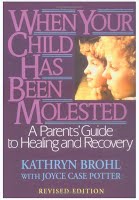 When Your Child Has Been Molested: A Parent’s Guide to Healing and Recovery
When Your Child Has Been Molested: A Parent’s Guide to Healing and Recovery
Written by Kathryn Brohl with Joyce Case Potter
This is the thoroughly revised and updated edition of the best-selling guide for families of children who have been molested. First published in 1988, this new edition includes current research and information on the nature and effects of molestation on boys and girls, as well as proven techniques for therapy, healing, and recovery. Using everyday language, the authors provide information, comfort, and advice on how to put the pieces back together again after a child has been sexually molested
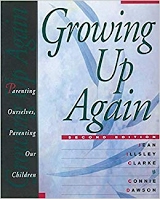 Growing Up Again: Parenting Ourselves, Parenting Our Children
Growing Up Again: Parenting Ourselves, Parenting Our Children
Written by Jean Illsley Clarke and Connie Dawson
Growing Up Again offers further guidance on providing children with the structure and nurturing that are so critical to their healthy development — and to our own. Jean Illsley Clarke and Connie Dawson provide the information every adult caring for children should know — about ages and stages of development, ways to nurture our children and ourselves, and tools for personal and family growth. This new edition also addresses the special demands of parenting adopted children and the problem of overindulgence; a recognition and exploration of prenatal life and our final days as unique life stages; new examples of nurturing, structuring, and discounting, as well as concise ways to identify them; help for handling parenting conflicts in blended families, and guidelines on supporting children’s spiritual growth.
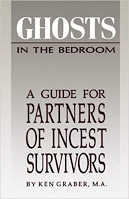 Ghosts in The Bedroom: A Guide for Partners of Incest Survivors
Ghosts in The Bedroom: A Guide for Partners of Incest Survivors
Written by Ken Graber
Although the impact of incest or sexual abuse can destroy relationships and test long-standing commitments, the information in this book may be the key to holding your relationship together through the journey to recovery. Ghosts in the Bedroom provides comfort and guidance for partners in the process of recovery. Graber draws from personal experience to show how partners can accept responsibility for their own issues, support the recovery of the incest or sexual abuse survivor and work toward solving relationship problems together.
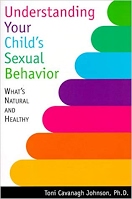 Understanding Your Child’s Sexual Behavior: What’s Normal and Healthy
Understanding Your Child’s Sexual Behavior: What’s Normal and Healthy
Written by Toni Cavanagh Johnson, Ph.D.
Describes healthy childhood sexual behaviors and contrasts them with sexual behaviors that signal a need for concern or intervention. While focus is mainly on problematic sexual behaviors, there is more in-depth information on normal childhood sexual behaviors than is usually found in one place. Covers natural and healthy behaviors, understanding children’s sexual exploration, characteristics and causes of problematic behavior, and how to decrease problem behaviors, and devotes much material to dispelling myths about child sexual abuse and children’s developing sexuality. The author is a clinical psychologist in private practice.
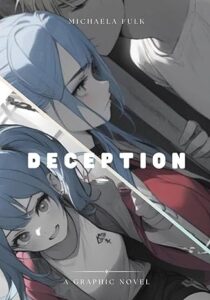 Deception, A Graphic Novel Written by Michaela Fulk
Deception, A Graphic Novel Written by Michaela Fulk
Sextortion has risen exponentially in the last decade. The impact on our youth is profound and alarming. This graphic novel is designed to share a story about a teen girl who experiences the prison of sextortion. You will journey through her trials and triumphs. There is also information for parents or caregivers on how to help. This graphic novel is ideal for teens, parents and counselors.
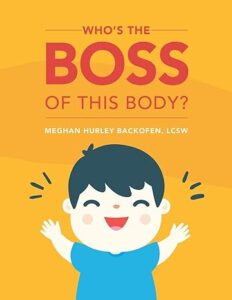 Who’s the Boss of This Body? Written by Meghan Backofen
Who’s the Boss of This Body? Written by Meghan Backofen
Child sexual abuse occurs at alarming rates, yet many people find it challenging to discuss the topic with their children. Often parents and caregivers are afraid of scaring their child or introducing sex at a young age. The conversation is avoided and as a result, most childhood sexual abuse victims do not disclose their abuse in childhood. This book is an effort to make it easier for caregivers and children to talk about sexual abuse without scaring children, or prematurely giving them information on sex. It describes the “uh oh” feeling that causes children to freeze and normalizes this response, rather than shaming a child for not yelling and running away if abuse has happened. It also helps children and their parents to really understand what it means to be the Boss of Your Own Body and that Secrets Are Not Safe.
También disponible en español, ¿Quién Es El Jefe De Mi Cuerpo?
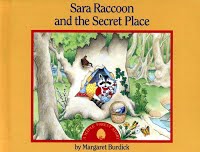
Sara Raccoon and the Secret Place
Written by Margaret Burdick
After days of rain and being stuck indoors with her brother and sister, Sara takes a walk in the forest and finds a wonderful place to make her own. She doesn’ t plan to share it and is horribly surprised when someone else discovers her secret, but it becomes even more special shared with a friend.
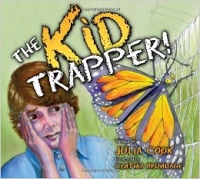 The Kid Trapper
The Kid Trapper
Written by Julia Cook
Illustrated by Cynthia Brundage
This book addresses the most often misunderstood piece in the puzzle of the sexual victimization of children, and that is acquaintance molestation. In a non-offensive manner, it takes the extremely sensitive issue of child-molestation and presents it in a way that gives the victim power and strength.
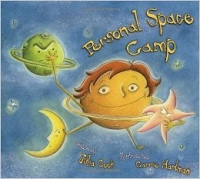 Personal Space Camp
Personal Space Camp
Written by Julia Cook
Illustrated by Carrie Hartman
Louis is back! And this time, he’ s learning all about personal space. Louis, a self-taught space expert is delighted to learn that his teacher has sent him to the principal’ s office to attend personal space camp. Eager to learn more about lunar landings, space suits, and other cosmic concepts, Louis soon discovers that he has much to learn about personal space right here on earth. Written with style, wit, and rhythm, personal space camp addresses the complex issue of respect for another person s physical boundaries.
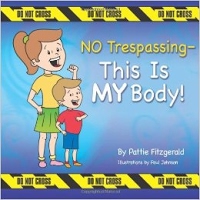 NO Trespassing — This Is MY Body!
NO Trespassing — This Is MY Body!
Written by Pattie Fitzgerald
Siblings Katie and her little brother Kyle learn about personal safety, private parts, and “thumbs up & thumbs down” touches by talking with their mom in a loving and easy-to-understand manner. With an empowering dialog that is never fearful, parents can use this book to begin this important discussion with their children. Katie and Kyle’ s mom also explains the essential “No Secrets” rule in their family, and that it is never their fault if they get an “uh-oh feeling” from anyone.
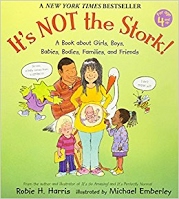 It’ s Not the Stork! A book About Girls, Boys, Bodies, Families, and Friends
It’ s Not the Stork! A book About Girls, Boys, Bodies, Families, and Friends
Written by Robie H. Harris
Illustrated by Michael Emberley
It’ s Not the Stork! helps answer these endless and perfectly normal questions that preschool, kindergarten, and early elementary school children ask about how they began. Through lively, comfortable language and sensitive, engaging artwork, Robie H. Harris and Michael Emberley address readers in a reassuring way, mindful of a child’ s healthy desire for straightforward information. Vetted and approved by science, health, and child development experts, the information is up-to-date, age-appropriate, and scientifically accurate, and always aimed at helping kids feel proud, knowledgeable, and comfortable about their own bodies, about how they were born, and about the family they are part of.
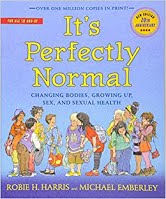 It’ s Perfectly Normal: Changing Bodies, Growing Up, Sex, and Sexual Health
It’ s Perfectly Normal: Changing Bodies, Growing Up, Sex, and Sexual Health
Written by Robie H. Harris
Illustrated by Michael Emberley
For two decades, this universally acclaimed book on sexuality has been the most trusted and accessible resource for kids, parents, teachers, librarians, and anyone else who cares about the well-being of tweens and teens. Now, in honor of its anniversary, It’ s Perfectly Normal has been updated with information on subjects such as safe and savvy Internet use, gender identity, emergency contraception, and more. Providing accurate and up-to-date answers to nearly every imaginable question, from conception and puberty to birth control and STDs, It’ s Perfectly Normal offers young people the information they need—now more than ever—to make responsible decisions and stay healthy.
To Report Concerns & Suspicions About Abuse
Child Abuse & Prevention
Colorado Child Abuse and Neglect: http://co4kids.org/
Stop It Now: www.stopitnow.org
The Enough Abuse Campaign: www.enoughabuse.org
National Center for Missing & Exploited Children: www.missingkids.com
National Center on the Sexual Behavior of Youth: www.ncsby.org
No Place Like Home: www.noplacelikehome.org
Joyful Heart Foundation: www.joyfulheartfoundation.org
The National Child Traumatic Stress Network: http://www.nctsn.org/resources
United States Department of Justice National Sex Offender Public Website: https://www.nsopw.gov
Illuminate Colorado: https://www.illuminatecolorado.org/
Darkness to Light: https://www.d2l.org/
Colorado Coalition Against Sexual Assault: https://www.ccasa.org/
Internet & Social Media Safety
I Keep Safe: https://ikeepsafe.org/
The National Center for Missing and Exploited Children, Net Smartz: www.netsmartz.org
Connect Safely: www.connectsafely.org
Check out:
Tips and Advice
Web Wise Kids: www.webwisekids.org
Enough is Enough Resource Page: www.enough.org/resource_center
Stop Think Connect: stopthinkconnect.org
Common Sense Media: www.commonsensemedia.org
Smart Social: https://smartsocial.com/
Cyberbullying: www.cyberbullying.org
Sexual Behavior in Children
Understanding and Coping with Sexual Behavior Problems in Children: The National Child Stress Traumatic Stress Network
Children’ s Behaviors: https://www.stopitnow.org/
Age-Appropriate Sexual Behavior: https://www.stopitnow.org/
One In Ten — National Children’ s Alliance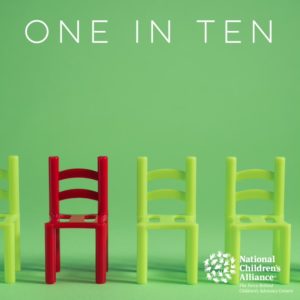
Engaging the brightest minds working to solve one of the world’ s toughest challenges—child abuse. Join National Children’ s Alliance for conversations with leading experts on science, law, medicine, morality, and messaging.
How childhood trauma affects health across a lifetime | Nadine Burke Harris
Feb 17, 2015. Childhood trauma isn’ t something you just get over as you grow up. Pediatrician Nadine Burke Harris explains that the repeated stress of abuse, neglect and parents struggling with mental health or substance abuse issues has real, tangible effects on the development of the brain. This unfolds across a lifetime, to the point where those who’ ve experienced high levels of trauma are at triple the risk for heart disease and lung cancer. An impassioned plea for pediatric medicine to confront the prevention and treatment of trauma, head-on.
Traditional Parenting Vs. Trauma-Informed Parenting: Pursuing Connection with Your Child
July 1, 2019. Parenting is not for the faint of heart. Understanding how to best love, teach, and correct our children is something we are continually learning. Add to that, learning to parent kids who have experienced trauma, and things that may have worked for our biological children now seem to have the opposite effect on our kids. In today’ s episode, Kristin Berry brings us practical insight and encouragement to help us parent our kids in a way that keep us connected.
Prevention
Secrets
The ‘Secret:’ The Key to Understanding Child Sex Abuse
Why we Don’ t Keep Secrets in Our House
Body Safety
Do Your Children Have Body-Safety Rules?
If It Feels Weird to Have to Force Your Kid to Hug their Relatives, There’ s a Reason.
Its Never Too Early to Teach Children About Consent and Boundaries
Grooming
How to Talk to Teens About Dating Violence
Parenting Tip of the Week — Show Dogs and Preventing Child Sexual Abuse
General
5 Steps to Protecting Our Children
7 Ways Teachers Can Help Prevent Child Sexual Abuse
10 Ways to Teach Your Child the Skills to Prevent Sexual Abuse
Child Abuse: How to Tell If Something’ s Wrong
Four Strategies for Protecting Kids from Sexual Predators
How and When to Talk to Your Child About Sexual Abuse
Protect Your Child from a Predator
Stop Sexual Abuse: Teach Your Kids to Say No!
What Every Parent Needs to Know to Keep Your Child Safe From Sexual Abuse
Sexual Development
Childhood Trauma
Overcoming Childhood Trauma: How Parents and Schools Work to Stop the Cycle
Sexualized Behavior
Sexual Development and Behavior in Children
Understanding and Coping with Sexual Behavior Problems in Children
Sexual Abuse
The Three Types of Sexual Predators
When a Child Tells About Sexual Abuse
Sexual Assault and Sexual Abuse
Tonic Immobility
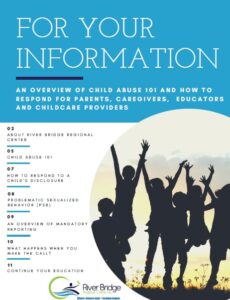 For Your Information: An Overview of Child Abuse 101 and How to Respond
For Your Information: An Overview of Child Abuse 101 and How to Respond
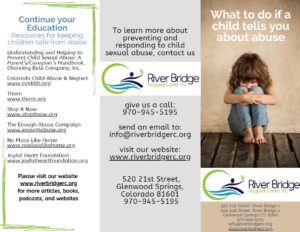 What To Do When a Child Discloses Abuse to You (English and Spanish pamphlet)
What To Do When a Child Discloses Abuse to You (English and Spanish pamphlet)
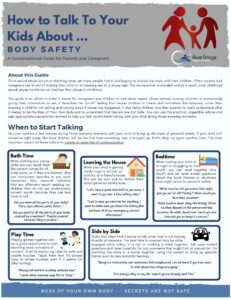 How To Talk to Your Kids About Body Safety (English and Spanish booklet)
How To Talk to Your Kids About Body Safety (English and Spanish booklet)
Building Brighter Childhoods. Illuminate Colorado strengthens families, organizations and communities to prevent child maltreatment.
With a research-based approach that emphasizes building promotive and protective factors, we address systemic and multi-sector issues by collaborating with families and partners at the community, state and national level to develop and implement powerful programs, policies and initiatives that keep kids safe in Colorado. Illuminate Colorado’s trainings cover a range of topics. Please visit their website for online trainings you can do at your own pace and in your own time.


